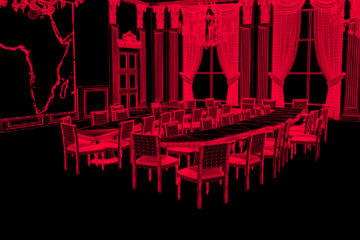Major Themes and Insights for the Work of the New Center
On 25 August 2018, Counterpoint: Navigating Knowledge was officially launched with a stimulating program of speakers and discussions in Berlin.
The general theme being “Beyond Pluralism: Contrapuntal Responses to Culture Wars, New Nationalisms, and the Challenges of the Anthropocene” (see the launch description), the event addressed two of the most pressing challenges for the planetary community today—globalization and climate change. Around 40 participants discussed the impact of globalization on the resurgence of local and national identities that often go together with a clear distinction between “us” and “them” and the universalization of the values and worldviews of one’s own group (defined by race, gender, class, worldview) or nation.
| In their introduction to the launch event, Whitney A. Bauman and Kocku von Stuckrad, co-founders and co-directors of the new center, spoke about how the idea of Counterpoint: Navigating Knowledge was born and how they see this initiative as an attempt to bring positions and knowledge systems together that normally are not perceived as being on an equal footing. This also means that scholars have to leave their niches and get involved in cultural, social, and political debates—and that hegemonic power systems should learn to listen to alternative ways of knowing. |  |
 |
Anthea Butler, Professor of Religious Studies and Africana Studies at the University of Pennsylvania, then gave her thought-provoking and highly topical Keynote Address on “Race and the New Nationalisms.” By comparing political dynamics in the USA with other places around the world, Professor Butler pointed out that key questions about migration, race, gender, and national identity are formed around the decision of who belongs, and who doesn’t belong to what is perceived as “us.” She also made clear that it is the responsibility of academics to raise their voices in public debate and to learn to talk to the media in a way that people outside of academic circles can understand. |
A roundtable discussion further reflected on Professor Butler’s arguments, as well as on the programmatic theses underlying the Counterpoint initiative (as laid out in the Counterpoint Manifesto, written by Whitney A. Bauman and Kocku von Stuckrad). The roundtable discussion was chaired by Claudia Bruns, Professor of Historical Anthropology and Gender Studies at Humboldt University, Berlin. Representatives of different groups and professions shared their insights and positions in a multi-layered conversation: Rachel Alliston, Director of Decad, Berlin, spoke about the contribution of art to critical social discourse and the way art projects convey knowledge that transgresses the limits of academic ways of knowing. Jens Tuider, Chief of Staff and Executive Assistant at ProVeg International, asserted the responsibility of academics for engaging in pressing environmental and social issues; founding a “think tank” is a start, but the Center should see itself as a “do tank” as well, which breaks down the barriers between academic theorizing and concrete political action in a situation of urgent crisis. Michael Scaturro, a freelance contributor to the Guardian and the New York Times, made important comments on the reciprocity of public opinion and media coverage.
 |
 |
As a result of the presentations and discussions with all participants, three core themes emerged that can serve as a guideline for Counterpoint activities.
- The key question of who belongs and who doesn’t (and who has the power to decide that!) can be applied to many conflicts in many diverse setting, from migration and the treatment of minorities to racism, nationalism, and culture wars, as well as to the question of who belongs to the human species and how we frame issues of non-human personhood in terms of law, ethics, and political representation. The question of inclusion and exclusion also applies to knowledge communities that are often strictly separated from one another. Counterpoint will explore the possibility of exposing different knowledge communities to each other, and even of conflating the spaces in which these systems operate (for instance, the spaces of the university, of the museum, of activism, of media, or of personal experience). The idea of “and also,” which Alissa Jones Nelson derives from Edward Said, can serve as a programmatic tool to find contrapuntal responses to hegemonic knowledge.
- In order to conflate spaces of knowledge and to queer the demarcations we too often take for granted, scholars need to leave the niches of their disciplines and engage in true conversation with people outside of the academy—at the same time acknowledging the fact that “the academy” has never really been systematically distinct from personal biases and societal developments. These conversations need to make sure that we can really listen to the voices of non-hegemonic knowledge systems and that alternative ways of knowing can challenge and enrich academic knowledge structures.
- We are caught in a quandary: On the one hand, the planetary community faces a crisis that in its urgency calls for direct action and quick decisions; on the other hand, all of our decisions can only be of a preliminary nature because the situation is so complex that we will never be able to anticipate all levels of impact that our decisions and activities will have. In this catch-22 situation, we have to constantly allow for adjustments of our evaluations, experiment with diverse settings and ideas, and be open to surprise, failure, and ever-new beginnings.
At the end of the launch event, Whitney A. Bauman and Kocku von Stuckrad, on behalf of the whole Counterpoint team, thanked all participants for their input and valuable insights, and invited everyone to get involved in the Counterpoint activities, be it through contributions to publications, organization of events, or growing the network and support of the new Center.



1 Comment
Counterpoint One Year On: Reflections and Experiences – Counterpoint: Navigating Knowledge · September 11, 2019 at 4:31 AM
[…] started off with a launch event in Berlin last August, “Beyond Pluralism,” where we had an excellent panel discussion about culture wars, the challenges of the new […]